
The Fabelmans is based on Steven Spielberg’s own life. The characters are stand-ins for his family. The protagonist, Sammy, is Spielberg himself. Spielberg was born on the east coast. His father, a computer engineer, and his mother, a classically trained musician and homemaker, moved him and his siblings first to Arizona and then to California following his father’s professional opportunities. His parents divorced when he was in high school. After high school, Spielberg maneuvered around Hollywoods studios trying to work his way into the film industry. These facts about the life of the world’s most famous and successful filmmaker are well known.
The Fabelmans is much more than a mere recounting of facts like what I did in that first paragraph. It is an expertly told story, richly and humorously layered. Watching it is like sitting at the feet of an accomplished raconteur and letting him whisk you away into a story that you care about simply because he is just so good at telling stories. I wanted to live in this film. I never wanted it to end. Because the telling itself is so alive, every moment in the story is surprising even though the outcome of each event is known. Watching Spielberg tell this story is like watching Fred Astaire dance. The gracefulness of his skill is so abundant you can take it for granted, like another sunny day. (Bonus: The Fabelmans includes the funniest scene I’ve seen all year. It’s one Christians will find it especially hilarious.)
Is everything that happens in the film factually accurate? I don’t know. I doubt Spielberg himself does. It is the nature of memory that the details of our lives become fuzzy over time. People who lived through the same events will disagree with each other on even the basic order in which things happened, never mind the way they felt about it and what it meant.
I think The Fabelmans is the way Spielberg wants to remember his childhood. It’s not all rosy. There’s a lot of heartache, but wisdom knows that life’s difficulties are essential aspects of life’s beauty. They make us who we are, though it is often only in retrospect that we can see the making. There’s a lot in The Fabelmans that you suspect Spielberg only recently has begun to understand, a lot that he had to learn to appreciate. Appreciative hindsight runs rampant throughout The Fabelmans. In that, it reminded me most of Grete Gerwig’s Ladybird.
I don’t want to spoil a moment of it because, like I said, the telling itself is so deliriously entertaining, but I do want to give an example that you’ll only fully understand after you’ve seen the film. At one point, Sammy makes a film that seems to be merely a work of fluff, but it also shows one young man who he is and another who he could be. And on top of all that, making the film helps Sammy process the trauma of his parents’ divorce. The film is good for the storyteller and the story hearers.
‘Popular entertainment made for personal reasons that calls out our flaws and compels us to be better’ could be the shortest possible description of Spielberg’s entire body of work. Did Sammy know he was doing that? The film is clear that he did not. Does Spielberg know that he’s been doing throughout his career? The Fabelmans suggest he does not, or at least that he didn’t until he made this film.
So The Fabelmans isn’t revelatory about Spielberg’s life. We knew these facts already, and it’s probably not factual anyway. But it is revelatory about the way one of cinema’s finest storytellers—if not the finest—thinks about storytelling, about its value for the storyteller and the audience. And even if you aren’t interested in any of that, it’s just a good story well told. Don’t take it for granted.
The Fabelmans is based on Steven Spielberg’s own life. The characters are stand-ins for his family. The protagonist, Sammy, is Spielberg himself. Spielberg was born on the east coast. His father, a computer engineer, and his mother, a classically trained musician and homemaker, moved him and his siblings first to Arizona and then to California following his father’s professional opportunities. His parents divorced when he was in high school. After high school, Spielberg maneuvered around Hollywoods studios trying to work his way into the film industry. These facts about the life of the world’s most famous and successful filmmaker are well known.
The Fabelmans is much more than a mere recounting of facts like what I did in that first paragraph. It is an expertly told story, richly and humorously layered. Watching it is like sitting at the feet of an accomplished raconteur and letting him whisk you away into a story that you care about simply because he is just so good at telling stories. I wanted to live in this film. I never wanted it to end. Because the telling itself is so alive, every moment in the story is surprising even though the outcome of each event is known. Watching Spielberg tell this story is like watching Fred Astaire dance. The gracefulness of his skill is so abundant you can take it for granted, like another sunny day. (Bonus: The Fabelmans includes the funniest scene I’ve seen all year. It’s one Christians will find it especially hilarious.)
Is everything that happens in the film factually accurate? I don’t know. I doubt Spielberg himself does. It is the nature of memory that the details of our lives become fuzzy over time. People who lived through the same events will disagree with each other on even the basic order in which things happened, never mind the way they felt about it and what it meant.
I think The Fabelmans is the way Spielberg wants to remember his childhood. It’s not all rosy. There’s a lot of heartache, but wisdom knows that life’s difficulties are essential aspects of life’s beauty. They make us who we are, though it is often only in retrospect that we can see the making. There’s a lot in The Fabelmans that you suspect Spielberg only recently has begun to understand, a lot that he had to learn to appreciate. Appreciative hindsight runs rampant throughout The Fabelmans. In that, it reminded me most of Grete Gerwig’s Ladybird.
I don’t want to spoil a moment of it because, like I said, the telling itself is so deliriously entertaining, but I do want to give an example that you’ll only fully understand after you’ve seen the film. At one point, Sammy makes a film that seems to be merely a work of fluff, but it also shows one young man who he is and another who he could be. And on top of all that, making the film helps Sammy process the trauma of his parents’ divorce. The film is good for the storyteller and the story hearers.
‘Popular entertainment made for personal reasons that calls out our flaws and compels us to be better’ could be the shortest possible description of Spielberg’s entire body of work. Did Sammy know he was doing that? The film is clear that he did not. Does Spielberg know that he’s been doing throughout his career? The Fabelmans suggest he does not, or at least that he didn’t until he made this film.
So The Fabelmans isn’t revelatory about Spielberg’s life. We knew these facts already, and it’s probably not factual anyway. But it is revelatory about the way one of cinema’s finest storytellers—if not the finest—thinks about storytelling, about its value for the storyteller and the audience. And even if you aren’t interested in any of that, it’s just a good story well told. Don’t take it for granted.

Elijah Davidson is Co-Director of Brehm Film and Senior Film Critic. Subscribe to Come & See, his weekly newsletter that guides you through the greatest films ever made, and find more of his work at elijahdavidson.com.
When Black Panther: Wakanda Forever isn’t being a Marvel movie, it’s a lot of fun.